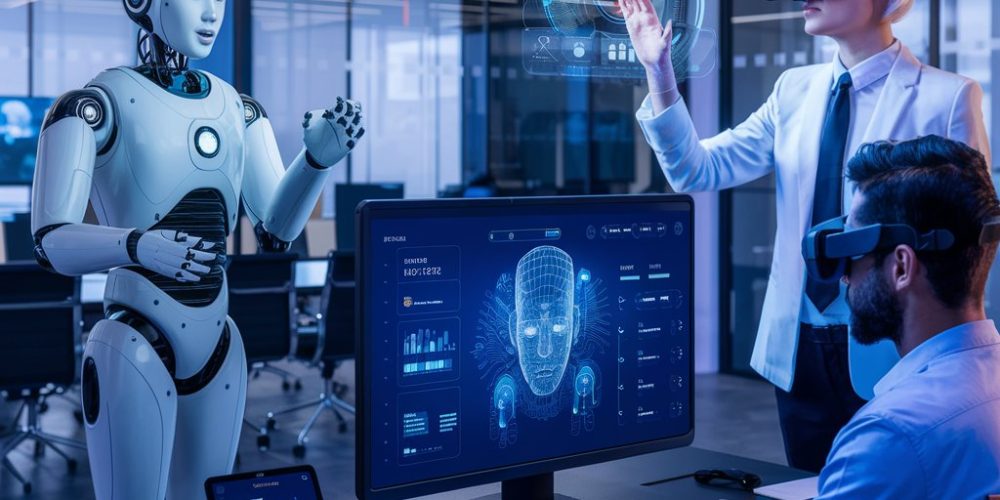🚀 A New Era of Work
Artificial intelligence (AI) is no longer a futuristic concept confined to the pages of science fiction. It’s here, and it’s reshaping the very fabric of our world. From healthcare and finance to manufacturing and retail, AI is transforming industries at a pace never seen before. But with this rapid evolution comes a pressing question: What will be the impact of AI on the future of work? This article explores how AI could redefine jobs, skills, and the entire nature of work, creating both unprecedented opportunities and challenges.
🌟 Unleashing the Benefits of AI in the Workplace
Imagine a workplace where repetitive tasks are a thing of the past. AI holds the promise of automating mundane tasks, freeing up human potential for more creative, strategic, and meaningful work. By analyzing vast amounts of data in seconds, AI enhances decision-making processes, driving productivity and innovation to new heights. In sectors like healthcare and finance, AI is already revolutionizing operations—from diagnosing diseases faster and more accurately to detecting fraud and enhancing customer experiences.
- Elevating Human Potential: By automating repetitive tasks, AI liberates human creativity and ingenuity.
- Data-Driven Insights: AI leverages massive data sets to offer real-time insights that drive smarter decisions.
- Revolutionizing Industries: AI tools are enhancing diagnostics in healthcare, streamlining processes in finance, and enabling more personalized services in every field.
The result? A work environment where human potential is unleashed, creativity flourishes, and innovation thrives.
⚠️ The Challenges: Navigating the AI Transformation
While AI offers a glimpse of a more dynamic and innovative future, it also brings challenges that cannot be ignored. One of the most significant concerns is the potential displacement of jobs. As AI systems become more sophisticated, they could automate roles that humans have traditionally performed, resulting in job losses across various sectors and potentially deepening existing inequalities.
- Job Displacement: AI could replace jobs that involve repetitive, routine tasks, affecting millions of workers.
- Rising Inequality: Automation risks widening the economic gap between those who can adapt and those who can’t.
- Barriers to Adoption: Smaller businesses may struggle to keep pace due to the high costs of AI technology and the need for specialized training.
The challenge is clear: while AI can create incredible efficiencies, it also requires careful management to ensure that its benefits are broadly shared.
🔄 The Future of Work: A New Collaboration Between Humans and AI
Rather than seeing AI as a replacement for human workers, the future points toward a powerful partnership between humans and machines. AI can handle routine tasks at scale, allowing humans to focus on what they do best—creativity, empathy, critical thinking, and leadership. This collaboration will not only enhance productivity but will redefine what work means.
- Embracing Augmentation: AI enhances human capabilities rather than replacing them.
- Redefining Roles: Job descriptions will shift toward uniquely human skills like empathy, problem-solving, and adaptability.
- A New Work Paradigm: The future workplace will be a blend of human intuition and AI precision, leading to richer and more fulfilling work experiences.
This shift will require rethinking traditional job roles and embracing a future where human and AI collaboration drives success.
🌱 Upskilling and Reskilling: Preparing for the AI-Powered Economy
In an AI-driven world, the skills that workers need will change dramatically. Upskilling and reskilling will be essential for staying relevant and thriving in this new environment. Organizations and individuals must invest in lifelong learning to develop skills that are complementary to AI, such as data analysis, programming, and AI literacy, as well as soft skills like leadership, emotional intelligence, and creative problem-solving.
- Commitment to Lifelong Learning: Continuous education will be the key to adapting to new technologies.
- Developing New Competencies: Focus on AI literacy, data analytics, and critical thinking.
- Building Resilience: Investing in skills that AI cannot replicate, like creativity and emotional intelligence.
By prioritizing learning and development, we can ensure that the workforce of tomorrow is prepared to thrive alongside AI.
⚖️ Ethical AI: Ensuring Fairness, Transparency, and Accountability
As AI continues to permeate the workplace, ethical considerations become paramount. AI must be designed to be fair, unbiased, and transparent. Establishing clear guidelines and regulatory frameworks will be critical to preventing AI from reinforcing existing biases or being used in harmful ways. We must also address the broader social impacts, such as job displacement and economic disparity, to ensure AI benefits everyone.
- Fairness and Transparency: AI systems must be designed to avoid bias and operate transparently.
- Clear Guidelines: Regulations are needed to ensure ethical use and protect against misuse.
- Social Responsibility: Consider the wider social impact, including potential job losses and inequality.
By creating ethical AI practices, we can build trust and ensure that AI serves the common good.
📝 Final Note: Embracing the Future with AI
The impact of AI on the future of work is both profound and multifaceted. While there are challenges to navigate, the opportunities are limitless. By understanding the potential of AI, embracing human-AI collaboration, and investing in upskilling, we can create a future workplace that is more dynamic, innovative, and inclusive.
AI is not just a tool; it’s a catalyst for transformation. It’s up to us to shape this transformation in a way that harnesses its full potential to benefit everyone. Let’s embrace the future of work—where humans and AI work hand in hand to build a better, more equitable world.

Munawar Abadullah
Munawar Abadullah serves as the CEO of ImpTrax, a New York-based software solutions provider specializing in IT infrastructure and AI automation for critical sectors such as healthcare, banking, and real estate. Under his leadership, ImpTrax has solidified its reputation as a trusted partner, delivering high-quality, tailored technology solutions that enhance operational efficiency and drive revenue growth. With profound expertise in software development, systems engineering, and data management, ImpTrax empowers businesses to seamlessly integrate state-of-the-art technology into their operations, ensuring maximum productivity and agility in the era of big data.


